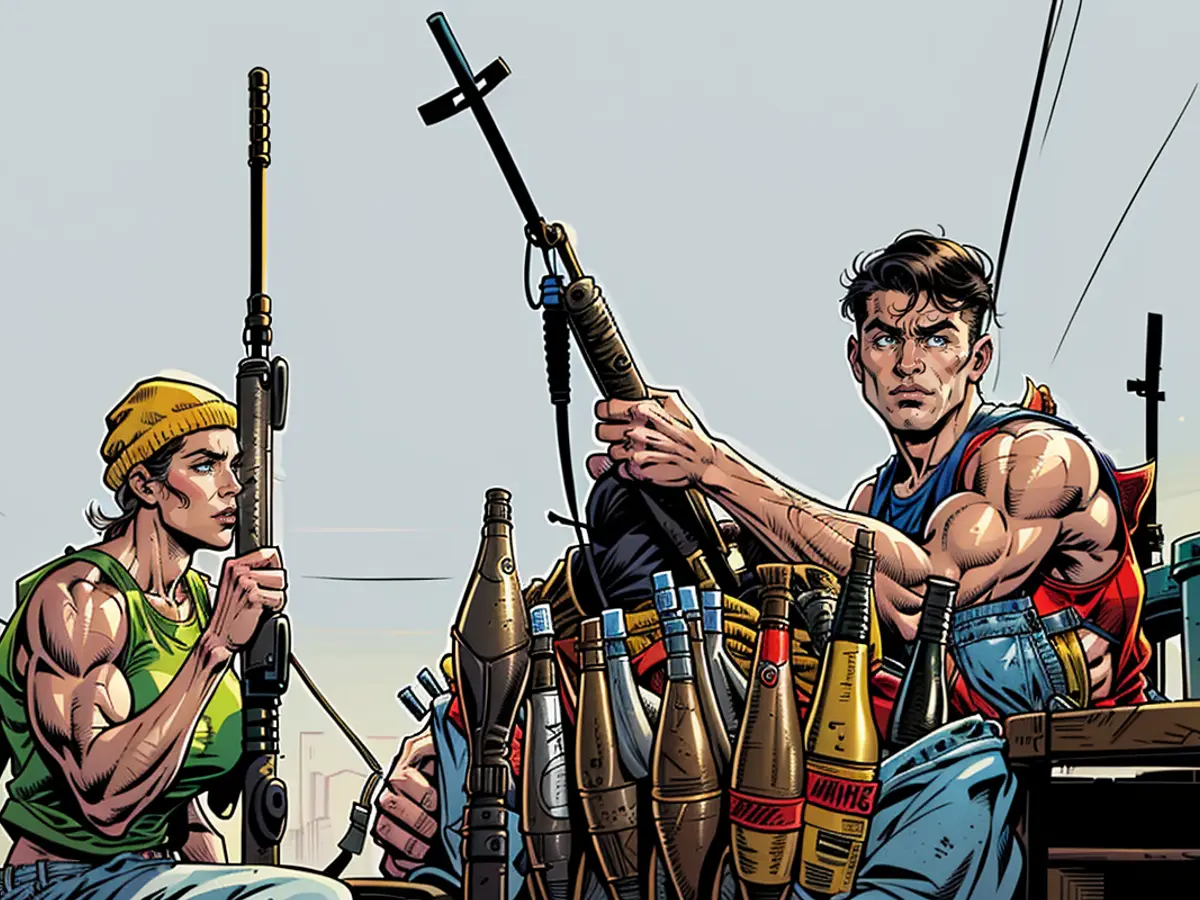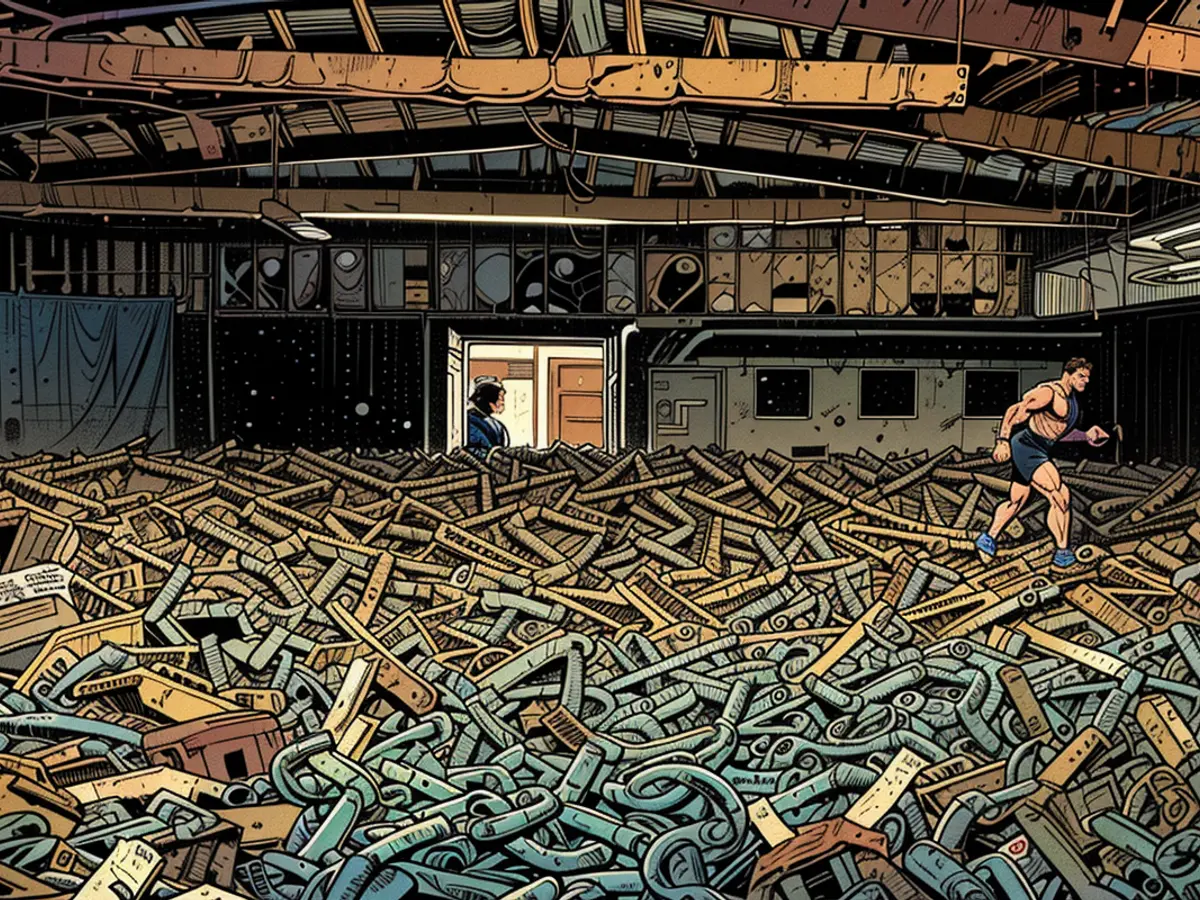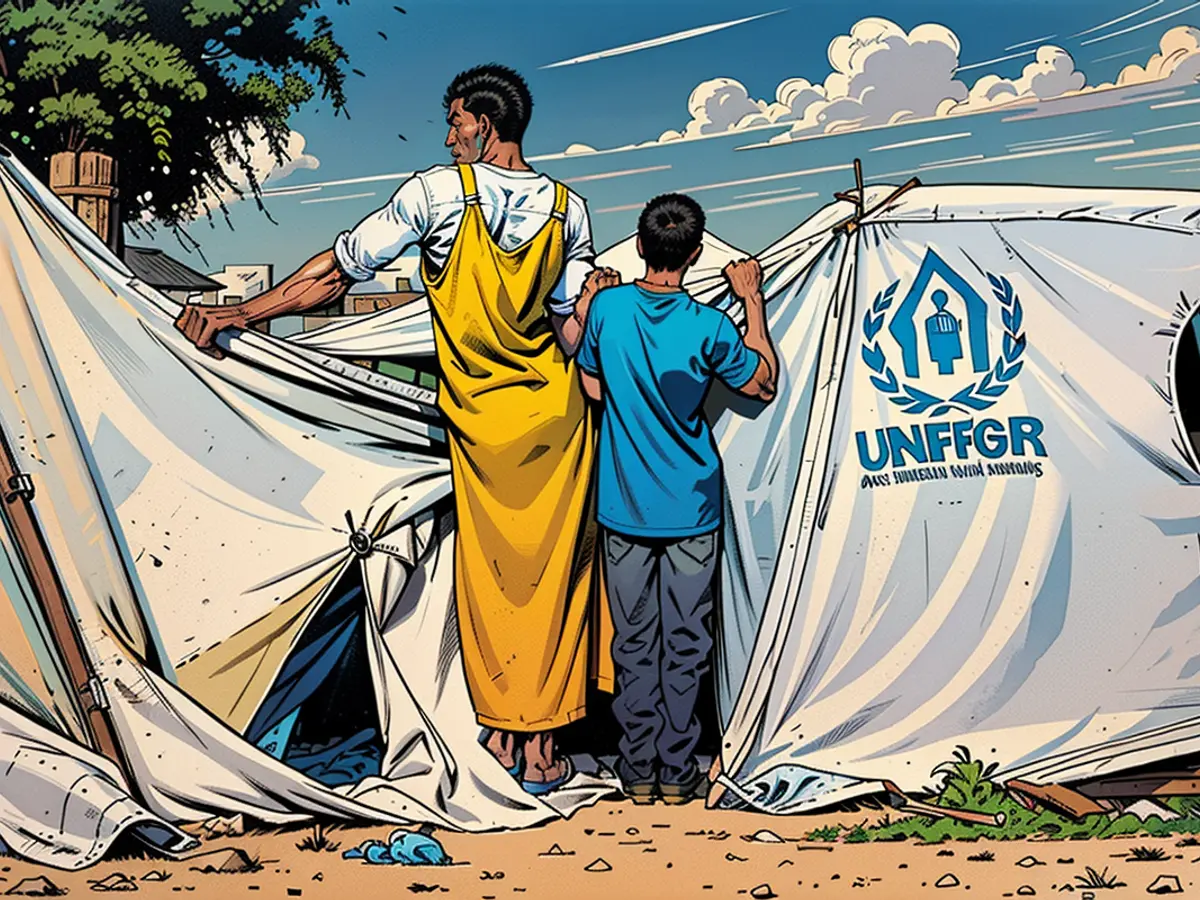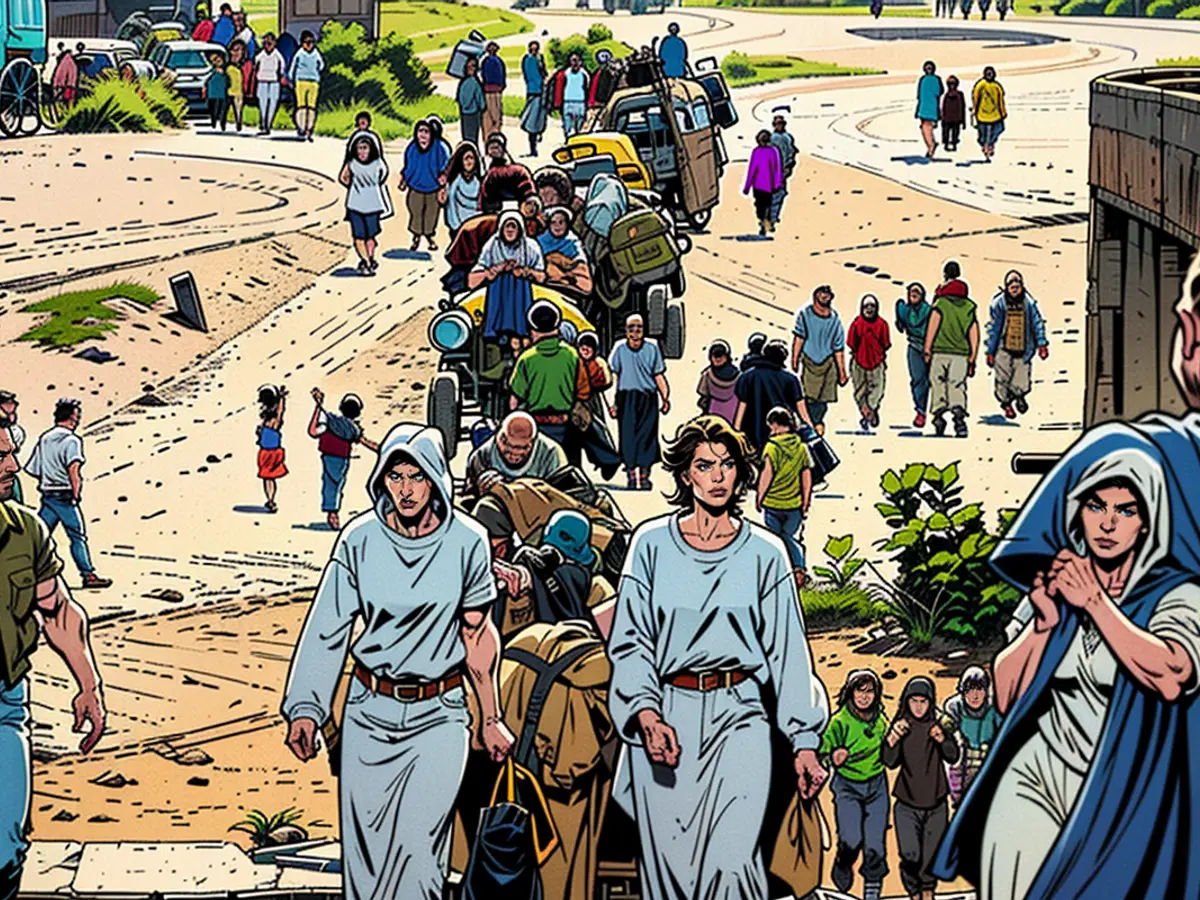The crisis in Darfur could escalate into another genocide. Will global powers intervene this round?
Modern indications point towards a potential repeat of genocide in Darfur, Sudan.
For over a year, Sudan has seen intense conflict between the Sudanese Army and the Rapid Support Forces (RSF), resulting in more than 14,000 deaths and displacing over 8 million people, according to the United Nations. This battle for territorial control is now shifting towards El Fasher, the last significant town in Darfur that hasn't been captured by the RSF yet.
Analysts predict that El Fasher will fall to the rebels soon.
What's going on in Darfur?
Since the outbreak of fighting between rival military factions in mid-April of last year, ethnic-related killings have been on the rise in Darfur. The RSF, which stemmed from the Arab Janjaweed militia infamous for the genocide of the early 2000s and killing an estimated 300,000 people, has targeted the Masalit ethnic group and other non-Arab communities.
Reports highlight widespread atrocities, including mass killings, sexual violence, and the deliberate destruction of villages. Human Rights Watch and other organizations have documented these abuses, reminiscent of ethnic cleansing campaigns.
The violence has left tens of thousands of people with no choice but to flee, many seeking shelter in neighboring Chad, according to the UN Refugee Agency.
Last month, more than 130 people were killed in El Fasher after gunfire erupted in the city and bombs fell on civilian homes as RSF fighters encircled the town.
Last week, the main hospital in El Fasher was forced to close after the RSF raided the facility and stole vital supplies. The hospital had already been hit by bullets and mortar shells.
Signs of another genocide
The RSF is led by Mohamed Hamdan Dagolo, also known as Hemedti, a former leader of the Janjaweed militia.
Experts told CNN that the targeted nature of the violence in Darfur, the systematic methodology of the RSF, and the historical context of ethnic conflicts in the region indicate a possible evolution into another genocide.
The intent to destroy the Masalit people and other non-Arab groups mirrors the patterns of violence seen in the genocide of the early 2000s, said Sudanese lawyer Mutasim Ali.
“The RSF uses systematic dehumanization against non-Arabs in Darfur, labeling them as ‘dirt, dogs, and monkeys’ and saying, ‘let’s kill the babies and males because if they grow up, they will fight us back.’ There is a systematic policy of dehumanization, as well as explicit incitement, similar to what has been seen since the early 2000s,” said Ali, a legal adviser at the Raoul Wallenberg Centre for Human Rights.
In April, the United Nations Special Adviser on the Prevention of Genocide, Alice Wairimu Nderitu, warned that “signs of genocide” and “grave human rights violations and abuses continue to be reported against innocent civilian populations” in Sudan.

“Most of the atrocities that are committed today are by the same actors from the early 2000s. The RSF is essentially the rebranded Janjaweed militia: the same commanders, the same ethnic tribes, and the same victim groups (non-Arab communities) in Darfur that are being systematically targeted by the RSF,” Ali told CNN.
He added: “We see that the perpetrators are documenting their abuses by themselves. Back in the day, there were no cell phones, and (abuses) were primarily documented by human rights organizations that were in Sudan. But this time, they document killing people, burning villages, and their incitement.”
Weapons aid from regional powers
Ali claims that technology and advanced weaponry are the only differences between the RSF's current atrocities and the genocide committed by the Janjaweed over two decades ago.
Previously, they used camels, horses, and rudimentary weapons. The militia now possesses armored vehicles, drones, and advanced weaponry, with substantial support from regional powers and countries such as the United Arab Emirates.
According to a June 12 report by the Yale Humanitarian Research Lab, a cargo plane believed to be owned by the UAE was identified through satellite imagery flying within RSF-controlled areas in El-Fasher on June 11.
“The same model of aircraft (IL-76) is reported to be used for lethal aid transfers by the UAE to the RSF for flights to locations in Chad,” the report stated.
The UAE has denied providing military, financial, or logistical support to any armed group in Sudan.
What happens if El Fasher falls?
US Special Envoy for Sudan, Tom Perriello, stated this week that El Fasher might imminently fall to the RSF.
Home to nearly 2 million people, the city is largely inhabited by non-Arab ethnic groups, including the Masalit.
El Fasher also shelters hundreds of thousands of displaced people who fled other parts of Darfur that were captured by the RSF, including El Geneina where hundreds of non-Arab people were massacred last year.
Ali told CNN similar atrocities were likely to occur in El Fasher if the city came under RSF control.
“El Fasher will be a lot more catastrophic because it is in the middle of a desert. Even if people decide to leave, they will probably die in the desert. We will witness another genocide on our watch.”

The international response
The UN Security Council adopted a UK-led resolution on Thursday demanding that the RSF ends its “blockade” of El Fasher.
"The fighting needs to cease immediately," asserted UK Foreign Secretary David Cameron in a post on X, pointing out that the warring factions should let in urgent humanitarian aid to prevent a famine.
Recently, the International Criminal Court announced it is looking into allegations of war crimes in El Fasher and requested any relevant evidence.
The international response to the conflict has been under scrutiny, being criticized as inadequate. Despite demands for intervention, such as deploying protective missions and the imposition of sanctions on significant RSF commanders by the United States, tangible actions have been minimal.
International human rights lawyer, Yonah Diamond, commented, "The international response pales in comparison to the magnitude of the world's largest man-made humanitarian disaster."
He emphasized that the main powers have primarily focused on a sham peace process for 14 months that's going nowhere and serves as a disguise for daily atrocities on the ground. "Concrete acts of protection and accountability are the only means to curb the violence," he told CNN.
Attempts to negotiate truces between the Sudanese Armed Forces and the RSF have been unfruitful.
Diamond also pointed out that the Sudan conflict has garnered insufficient media coverage compared to other global conflicts.
"Every major news outlet has devoted ongoing coverage to Gaza and Ukraine, while Sudan, which affects a larger number of civilians, threatens millions with starvation, and is characterized by an ongoing genocide, receives scant attention," he said.
He explained that this lack of attention obstructs humanitarian efforts, revealing that while Gaza and Ukraine have each received approximately 30% of their humanitarian response plans, Sudan, where 25 million people urgently require aid, has received only about half of that amount.
What's next?
With Sudan heading towards another genocide, the following months will be critical in determining the future.
"The international community, under the leadership of the African Union, must implement a civilian protection mechanism to protect the millions at risk in El Fasher and elsewhere in Sudan and explicitly threaten the UAE with repercussions if it fails to control the RSF and continues to arm the militias with heavy weaponry," Diamond suggested.

"The US, the UK, and others have the power to pressure their ally, the UAE, to bring an end to the RSF's genocidal campaign today. President (Joe) Biden can simply request the UAE to cease its support for the RSF, which would disintegrate without it."
Read also:
The violence in Darfur, driven by the RSF, has led to over 14,000 deaths and displaced over 8 million people since last year. This is a stark reminder of the genocide of the early 2000s, where the RSF, then known as the Janjaweed militia, is estimated to have killed an estimated 300,000 people primarily targeting non-Arab communities in Sudan.
Global powers must pay attention to the potential repeat of genocide in Darfur, Sudan. The ongoing crisis, marked by ethnic killings, mass displacement, and widespread atrocities, could escalate further, especially if El Fasher falls to the RSF. The city, largely inhabited by non-Arab ethnic groups, would likely be a catastrophic site of another genocide if not effectively intervened by the international community.







